Barghouti: ‘Israel Is a Soap Bubble About to Burst, and for Every Sinwar and Deif, a Thousand Will Rise’ (Exclusive)
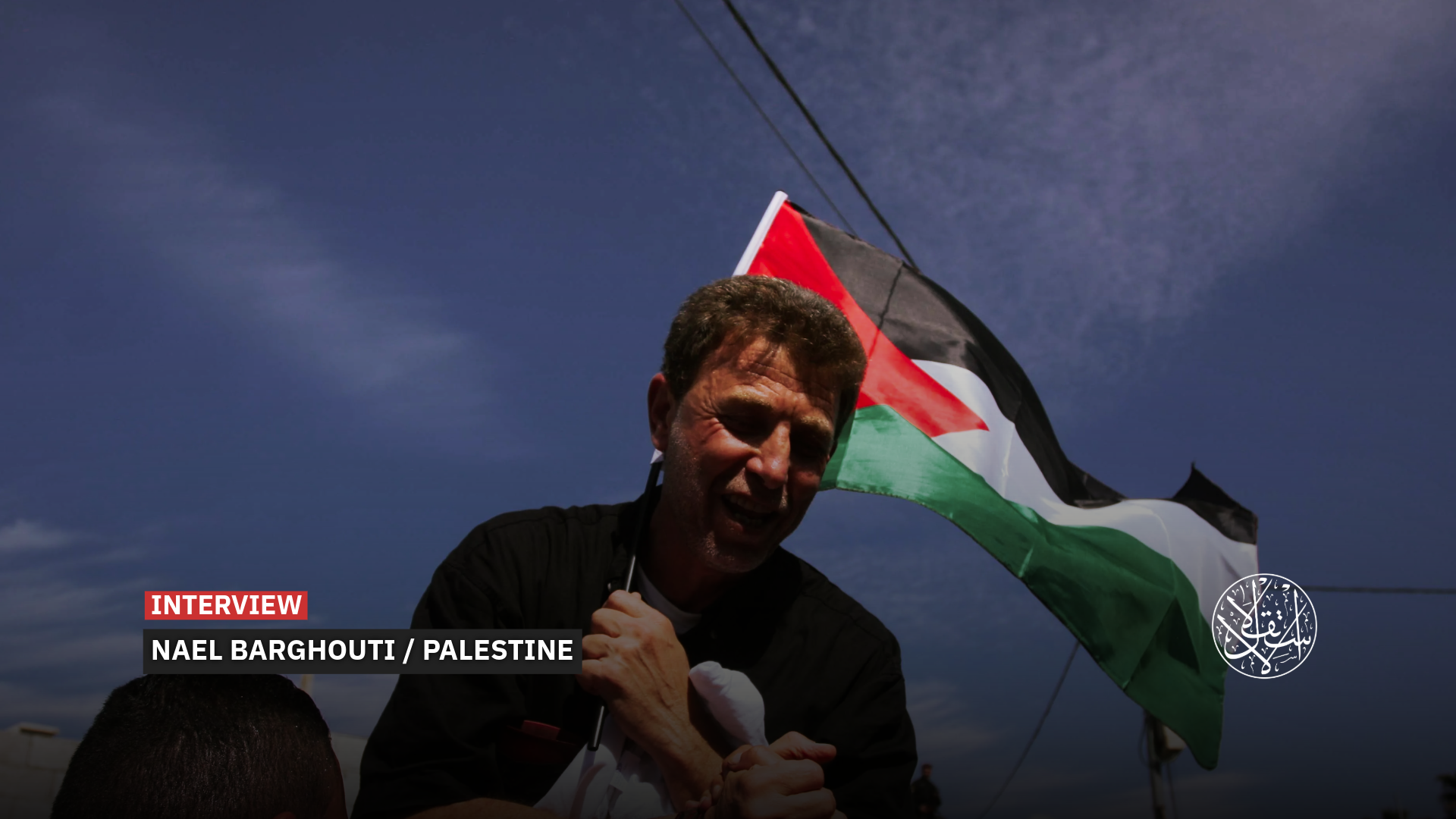
“The smallest child’s shoe in Gaza today is stronger than the official Arab position on the Palestinian cause.”
Nael Barghouti, the world’s longest-serving former Palestinian detainee, warned that the recent U.S. and Israeli withdrawal from Doha talks signals a planned military escalation far worse than previous attacks, a move the Resistance fully expects.
“This could be a form of blackmail to give hostile media and governments space to blame the Resistance and its negotiating delegation for the worsening famine facing Gaza’s Palestinians,” he told Al-Estiklal during an exclusive interview.
On the Arab states’ response to the ongoing massacre in Gaza, Barghouti said, “The smallest child’s shoe in Gaza today is stronger than the official Arab position on the Palestinian cause.”
Addressing Egypt, he warned, “You will be the target in the coming days. The Egyptian people must understand this. If Gaza falls, your responsibility will only grow.”
Reflecting on the future, he stressed, “The price we pay is heavy, but from these ruins and this genocide will emerge a generation that carries the banner of victory, not just for Palestinians but for all Arabs and Muslims.”
He dismissed Israel as “a soap bubble about to burst,” and said, “Tomorrow a thousand will rise to replace Sinwar and a thousand to replace Deif.”
After more than four decades in detention and thanks to Operation al-Aqsa flood, Barghouti, now 67, was freed in February 2025, carrying the weight of years of resilience and exile.
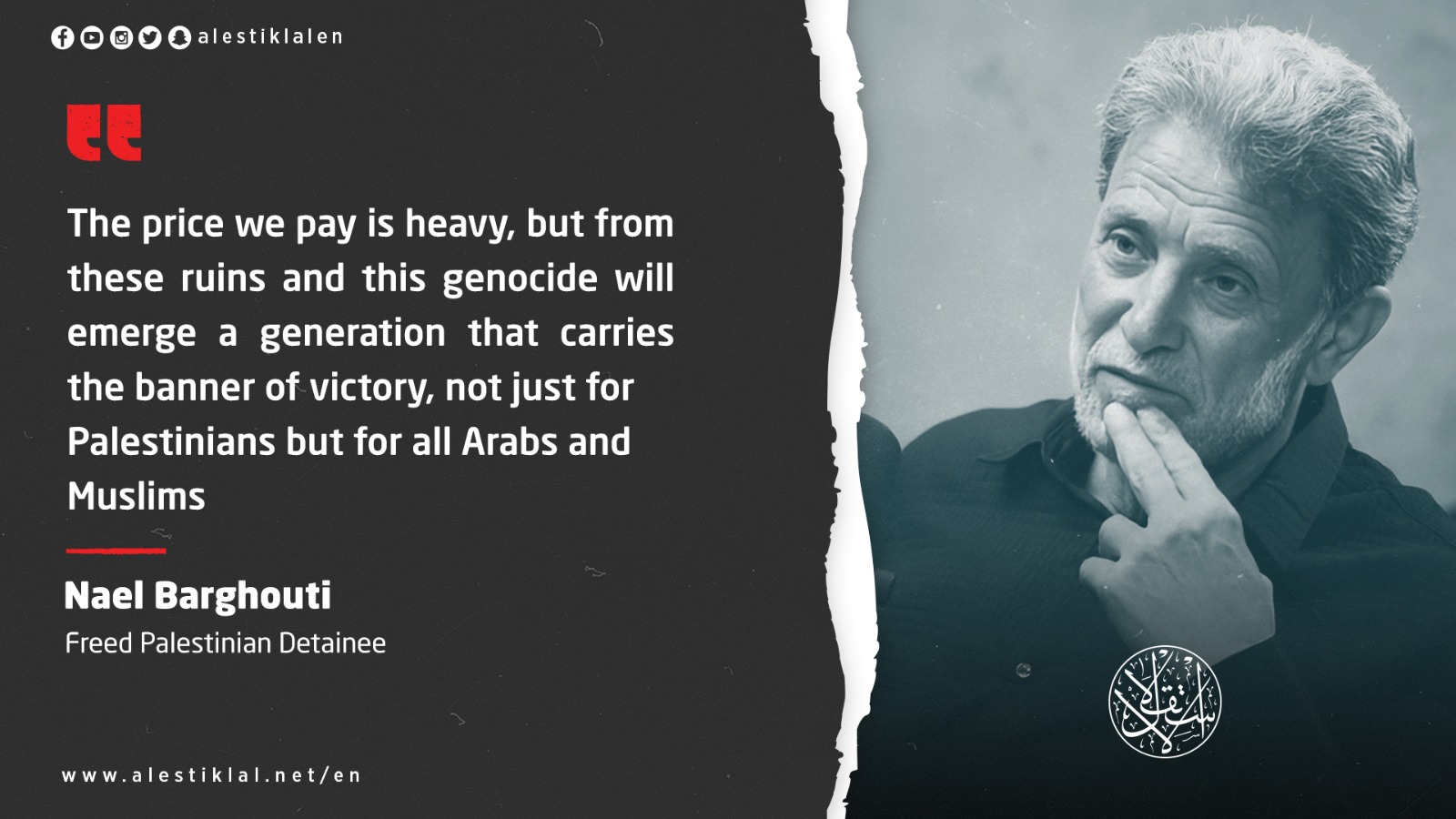
Prison and Exile
Personally, how did prison affect your thinking and outlook on life? What was the impact?
The greatest lesson I learned from prison that shaped my outlook on life is that a free person must live with dignity and pride.
I lived expecting one of three things: to die as a martyr, to be disabled, or to be imprisoned. Yet, this never changed my view of life. We must live normally, but when we face oppression or occupation, we must never accept it; we resist it until we regain our freedom and independence.
This is my belief, whether I am detained or free. To me, life means either living with dignity and pride or dying a martyr. I pray to achieve both.
Can you share your feelings about exile and how you have endured being away from Palestine after your release from Israeli Occupation prisons?
We were forced out of our homeland and unjustly exiled. Still, we accept this reality now to avoid becoming an obstacle to our people’s fight against the cruel war waged by the Zionist enemy [the Israeli Occupation] on our land.
We accepted exile with heavy hearts, holding on to the hope that one day we would return home with dignity. Whatever we’ve endured is little compared to the sacrifices the Palestinian people have made for their land and holy sites.
I always say, better a hard life at home than a comfortable one in exile.
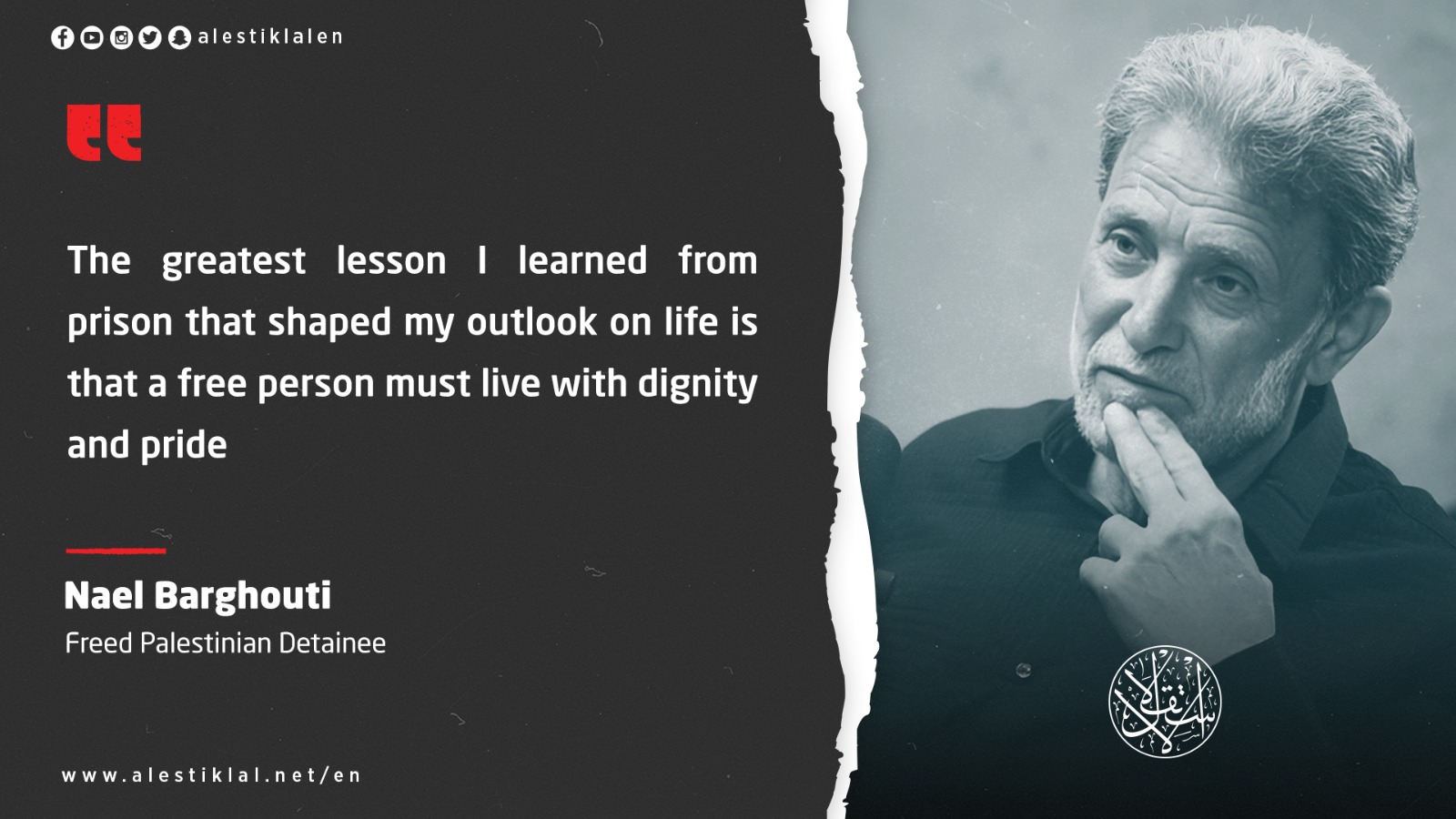
The world often calls for the release of Israeli captives held by Hamas. Has “Israel” succeeded in portraying a sense of justice that makes the world forget about the Palestinian detainees?
This happens because the Zionist movement controls the voices and pens of many media outlets worldwide. They have ingrained the idea that the right to freedom belongs only to Zionists. If any Zionist is harmed anywhere in the world, their freedom takes precedence over everything else.
For decades, the Israeli Occupation state has taken our detainees, killing and torturing them. Yet, global attention to us as an occupied people or to our detainees is minimal compared to the widespread concern for Zionist issues.
This reflects the Zionist control over minds. We, as a nation, bear a great responsibility to confront this.
In this context, I also point out that a large part of the world hypocritically supports the Zionists, fully aware they have no rightful claim. Why don’t they see the dozens, even hundreds, of children arrested while still minors? Why don’t they speak about ordinary women who only want to be free, yet are arrested and humiliated? A large part of the world is deeply hypocritical, sadly.
In the past two years, around 73 detainees have died inside prisons. Many bodies were hidden and ignored by the enemy [the Israeli Occupation]. The enemy steals the bodies of our martyrs, conducts scientific experiments on them in labs and hospitals, and steals their organs, and no one speaks about this. Reports have been written but were disregarded.
It’s said that leader detainees face special forms of torture and punishment. How does the Israeli Occupation treat them?
Sometimes, the Israeli Occupation inflicts harsher torture on prominent detainees to break their symbolic role and to demoralize others. But basically, the Israeli Occupation considers every detainee a leader. Anyone fighting to liberate their land is a symbol, even if they are still young.
Where does a detainee draw the strength to endure oppression and torture?
From the conviction that they are right, that occupation must end someday, and the awareness that the Israeli Occupation uses them as leverage against the Resistance. They see themselves as a vital part of the historic struggle against a cruel and oppressive occupying state.
All these factors, and more, fuel a detainee’s endurance against the Israeli Occupation’s abuse.
We spent years in prison, refusing to be used as a bargaining chip against the Resistance, firmly standing by it in all its decisions.
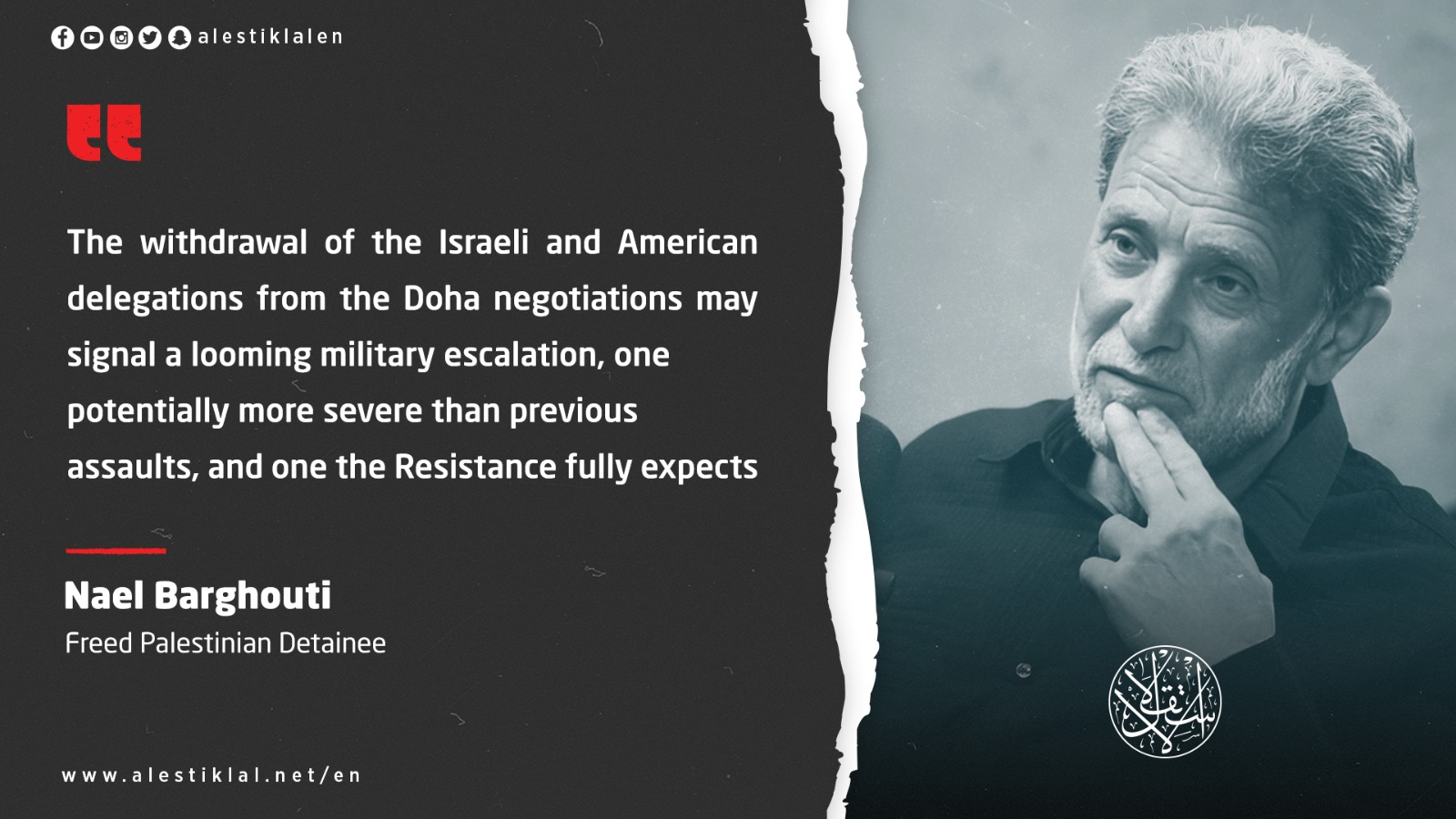
Operation al-Aqsa Flood
How did you receive the news of Operation al-Aqsa Flood while in prison?
I heard it on the radio and saw it on television while still in prison. Our reaction was one of hope; this is exactly what we expect from our brothers in the Resistance: that they would never abandon the cause or leave us behind bars. When I heard the news, I woke the other detainees and told them, “Get up and see what our brothers have done!”
The scenes were deeply moving. Inside the prison, those moments filled us with pride. We felt a renewed sense of hope for our freedom and for the victory of our cause. We knew the enemy [the Israeli Occupation] would strike back, and we also understood that liberating our land would come at a cost. What struck me most was the sight of the glider used by the Resistance in the attack.
How did you cope with the destruction and massacre of Gaza’s people that followed?
I have said this before, and I say it again. The price we pay is heavy and great, but from these ruins and this massacre will emerge a generation that will raise the banner of victory not just for Palestinians but for all Arabs and Muslims and all those who believe in justice worldwide.
Resistance is not a shame. It is something we are proud of. This is not empty talk. Those who have abandoned the Resistance are now falling from the eyes of all free people worldwide. Liberating the homeland is no easy task; it’s a mission worthy only of the honorable and the principled.
We have never faced our enemy on equal footing in terms of power and resources, but resistance, especially the Palestinian Resistance, has always been a natural and legitimate response by every historical standard.
I see it as a successful model. Since the occupation of our land began, we have continued to unsettle our enemy, denying it peace, and we will never stop.
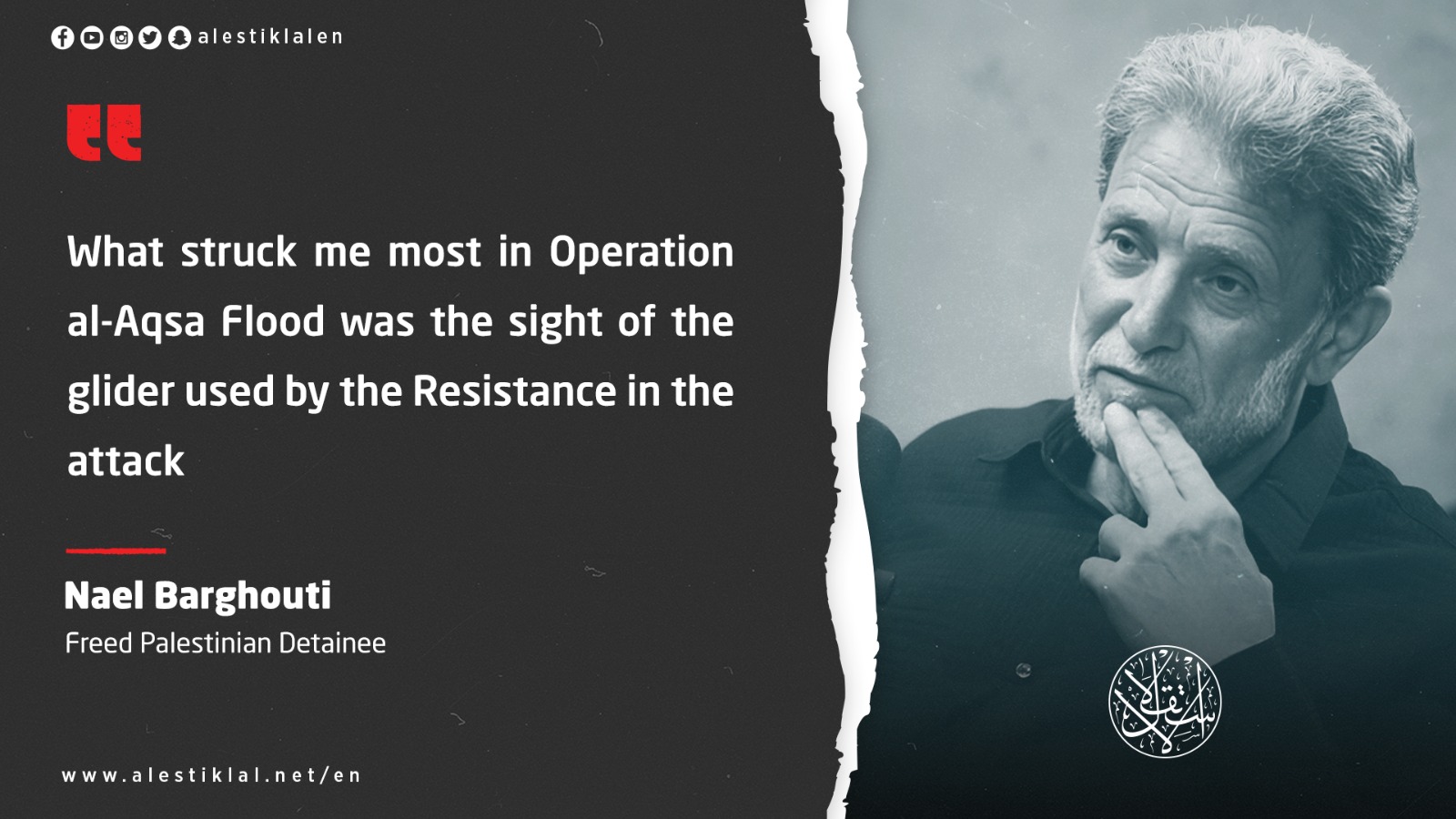
What do you say to those who claim that Operation al-Aqsa Flood was reckless and an uncalculated risk?
This opinion says more about those who hold it. The problem is that critics of the Resistance believe it should follow a certain pattern, one of weakness, quiet, and predictable pace. But Operation al-Aqsa Flood was an extraordinary act. Every person has the right to resist occupation by all legitimate means recognized under international law. A people that does not resist the occupation of its land does not deserve independence.
We should ask ourselves: Was Algeria reckless in resisting the French? They sacrificed an estimated six and a half million martyrs. Their last revolution from 1954 to 1962 cost two and a half million martyrs.
Was Vietnam’s resistance also reckless and uncalculated?
Operation al-Aqsa Flood is one stage in the Palestinian struggle for liberation. It is not the end of the fight and could be the beginning of true liberation. Previous forms of resistance were just one branch among many against the Israeli Occupation.
Operation al-Aqsa Flood shook the Israeli state and also shook Arab minds that had leaned toward unfair and unequal peace, placing trust in the Israeli Occupation and signing costly agreements that did not benefit our Arab and Muslim peoples.
Anyone may criticize how people resist, but no one has the right to betray it or blame it for destruction or setbacks.
Resistance is an honor for any person and any people. The Palestinian people’s battle is theirs and also the nation’s. For example, was Egypt reckless in 1956 when it decided to take back its rights in the Suez Canal? Even if some thought so, did anyone blame it for reclaiming what was rightfully theirs?
On the contrary, all Arabs stood with Egypt against aggression and no meaningful criticism was directed. Were the Iraqis reckless in the sacrifices they made in the 1920 revolution against British occupation?
If people blame the Resistance because of the heavy sacrifices and the harsh massacre in Gaza, then that blame should not be placed on the Resistance but on the brutal enemy, thirsty not just for Palestinian blood, but for the blood of any free person fighting to protect their land and sacred sites.
The blame falls on those who back the Israeli Occupation under the guise of being “rational,” when in reality, there is nothing rational about it.
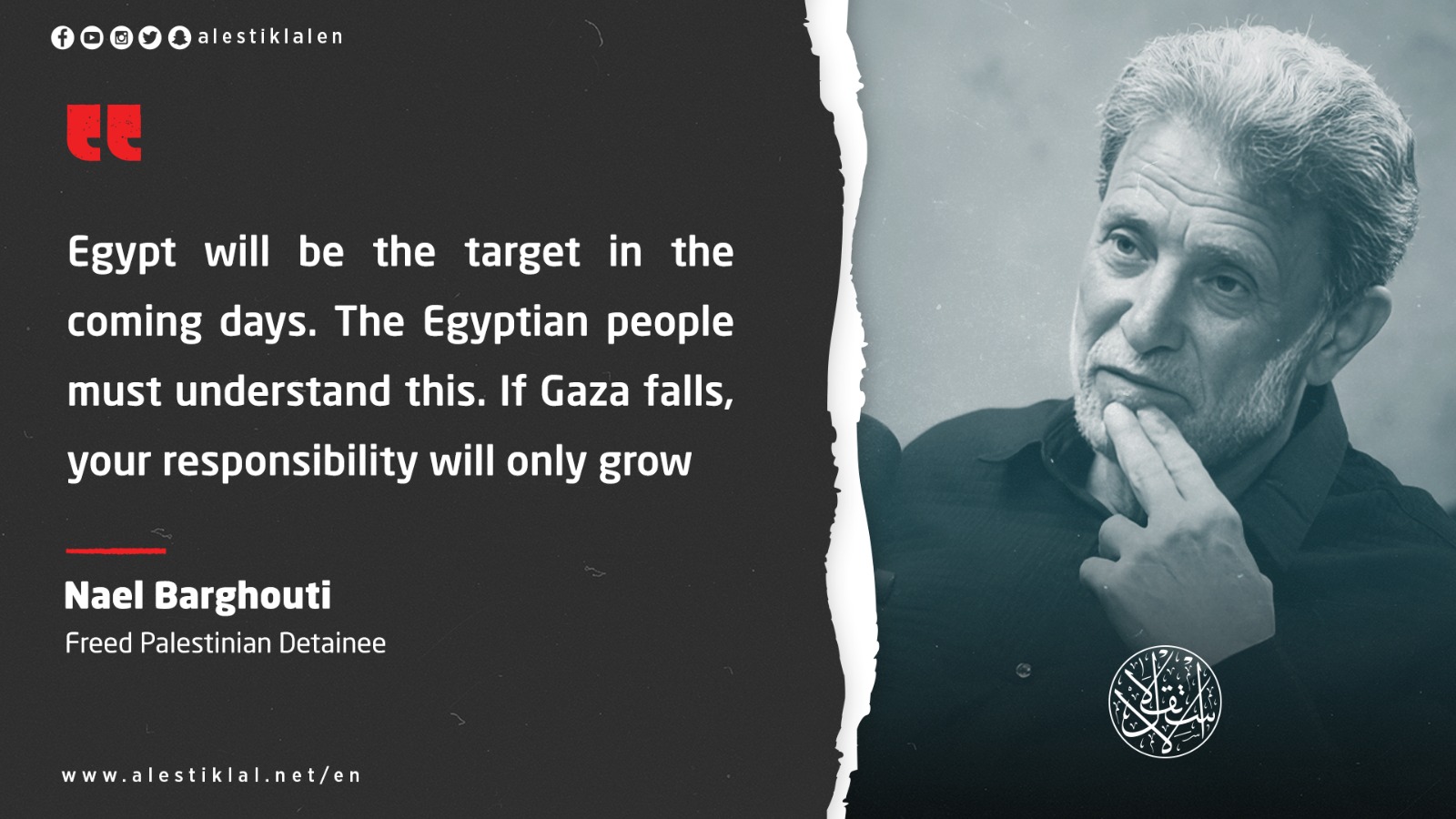
Doha Negotiations
Following the withdrawal of the Israeli and U.S. delegations from the Doha talks, do you think something is being planned behind this move?
This withdrawal may signal a planned military escalation harsher than previous attacks, which the Resistance fully expects. It may also be a form of blackmail, giving hostile media and governments space to blame the Resistance and its negotiating team for the famine and massacre in Gaza, pushing the delegation toward further concessions.
That is why I say anyone who values freedom, whether they agree or disagree with the Resistance on ideas or beliefs, must stand with the Resistance in this matter of negotiations. Supporting the negotiating team is supporting every honorable and free person in the world.
Even if you have reservations about the Resistance regarding Operation al-Aqsa Flood or the overall battle, the real call is to stand with the Resistance now because it serves all those who hold principles.
If the Israeli Occupation succeeds in forcing the Resistance to surrender to save Gaza, how do you see the Resistance’s future?
The Resistance may face losses, pressure, or setbacks during the battle, but I don’t believe it will ever reach the point of surrender, and I hope that never happens.
Even if one group falls, a stronger one will rise in its place; this is the Palestinian people’s way.
The idea of resistance will never disappear. Those who will vanish are the conspirators, even if today they find themselves in a moment of pride or are deceived by the possibility of resistance fading, they are the ones who will truly disappear. This is my belief and expectation.
How do you see the Resistance preparing for an operation like al-Aqsa Flood despite the difficult conditions, including the siege?
It comes down to seizing opportunities, even partial ones. History shows, for example, that a British ship carrying ammunition sank off Khan Yunis. The Resistance made excellent use of that resource and its munitions.
Using intelligence, studying how to exploit chances, and leveraging both explosive and unexploded remnants from the Israeli Occupation, alongside personal effort, local ingenuity, and creativity, these things overcome harsh conditions as long as there is faith in the cause and justice.
As the saying goes, necessity is the mother of invention. This is how circumstances are overcome no matter how difficult.
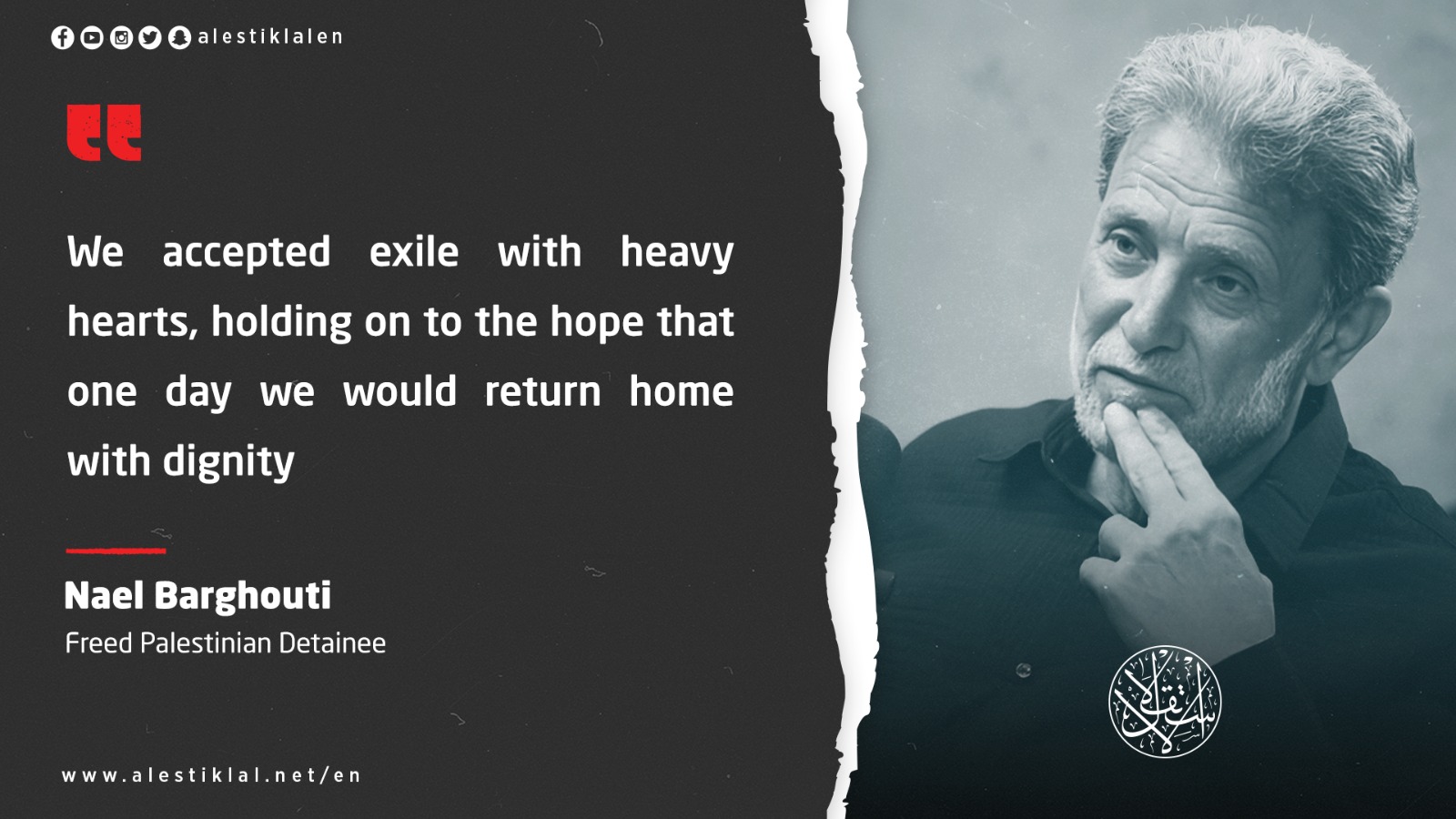
On the first anniversary of Commander Mohammed Deif’s martyrdom, how do you remember his legacy and the end of his life?
Commander Mohammed Deif is not just a memory; he is present among us. He was an exceptional figure. Freedom lovers worldwide honor such great leaders. Deif was the second chief of staff of an army or resistance to be martyred on the battlefield after the great Egyptian chief of staff, Abdul Munim Riad.
Mohammed Deif represents a shining symbol of the sacrifices made by leaders among Arabs and Muslims.
The global left praises Che Guevara, who sacrificed himself for his principles. Today, people of conscience, Muslims and non-Muslims alike, celebrate Mohammed al-Deif. His impact and legacy will only grow stronger over time. He was the commander who troubled the Israeli Occupation for decades.
Deif is part of a historic line of great fighters, like Abd al-Karim al-Khattabi in the Arab Maghreb, Omar al-Mukhtar, and the freedom fighters of Algeria. He is the extension of al-Qassam resistance, a continuation of every sincere struggle for principles in this world.
Many top commanders have been martyred in the genocidal war on Gaza. How do you see the effect of this on the Resistance’s performance and future?
This is the true victory of the Resistance. It is an institution, not random acts. When a commander is martyred, his student follows in the same path, with the same dedication and resources. The Resistance recovers quickly, thank God.
This is the secret behind the resilience of the Resistance and the Palestinian people; it’s a deeply rooted culture. We must match, if not surpass, the Israeli Occupation in organization and the ability to bounce back from losses.
Investing in future generations is a core value inside the Resistance. The Resistance always works to ensure each generation is greater than the last.
History teaches us a lesson. At the Battle of Mu’tah, commanders fell one after another. Six years later, the leaders triumphed at Yarmouk. Tomorrow, a thousand will rise to replace Sinwar and a thousand to replace Deif. This applies not only in the military field but across all areas.
How do you respond to demands for the Resistance to disarm?
Those who call for disarming the Resistance wrongly believe it will solve the problems with the Israeli Occupation. No resistance would accept disarmament without regaining its land. Even if they forced disarmament through mass killing and genocide of civilians, women, and children, that would not end the resistance.
We remember that when the resistance left Beirut, it marked the birth of a new resistance in southern Lebanon, which later led to a major defeat for the Israeli Occupation.
The point is, the idea of resistance can never die; the enemy will face it wherever it goes until it lifts its hand off our lands and holy sites.
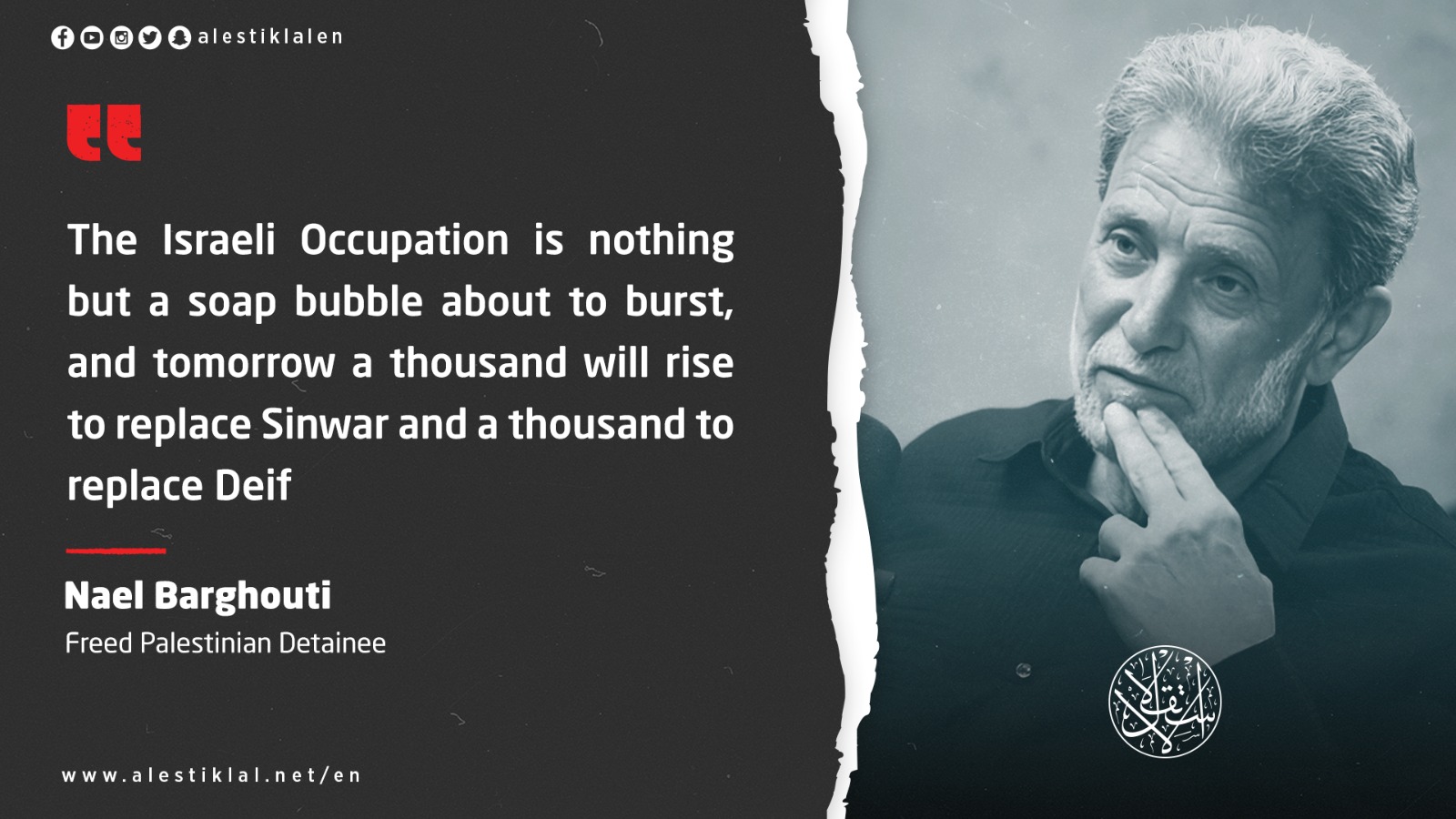
The Arab Regimes and the Palestinian Resistance
How do you see the official Arab and Islamic stance regarding the developments in Gaza so far?
I say frankly, the smallest child’s shoe in Gaza today is stronger than the official Arab position on the Palestinian cause. The states and regimes that have aligned with the Israeli Occupation’s political and media discourse do not deserve the honor of defending or resisting.
I also hold some blame for the people. If we go back to 1956, when Egypt nationalized the Suez Canal, protests erupted spontaneously from the ocean to the Gulf without any coordination.
Everyone stood with Egypt. Damascus Radio broadcast “This is Cairo” after the Voice of the Arabs radio was bombed.
That kind of spontaneous feeling must exist among the people. On that note, I say Egypt will be targeted in the coming days, and the Egyptian people must realize this. If Gaza falls, your responsibility as Egyptians will increase. I address the people: be the main pillar for the entire nation. This is your destiny.
To every free and honorable soldier in the Egyptian army: remember your great worth and your respected place in the nation. In 1956, Syrian officers training in Egypt launched a suicide boat attack and destroyed the largest French warship attacking the country. Rekindle that spirit and truly stand as part of the nation. Your solidarity with Gaza today is, above all, solidarity with yourselves.
Do you have a message for the Palestinian Authority regarding its political performance since Operation al-Aqsa Flood until now?
I tell the Authority: You are supposed to be a product of the PLO. You should represent this organization and be the guardian of its name. I mean, you should work toward liberation, not authority.
If you cannot liberate Palestine, at least stand with those striving for this great goal. Do not stab it in the back or align yourselves with any plan serving the Israeli Occupation.
In moments of weakness, agreements were signed that brought disaster upon the Palestinian people because of you. I believe the Palestinian people will express their true voice in the first fair elections, so every side understands its value to these great people.
Let everyone who said yes to the Israeli Occupation or yes to agreements with it know how the people see them.
What message do you send now to the Palestinian people?
I say to them: stand behind the Resistance and never abandon it. Resistance is the honor of these people. It is the strongest and most effective means to regain our rights. No people have reclaimed their land without resistance, no matter the sacrifices.
Resistance unites all Palestinian groups; surrender and successive concessions do not. The Israeli Occupation has no legitimacy on our lands. Whoever recognizes that is a wrecking tool in the wall of our just cause. So stand with the Resistance and never abandon it. We all must understand that resistance is not only in Gaza, even if Gaza is the epicenter of the conflict and pays the heaviest price.
Wherever the Palestinian people are on their lands, resistance exists through their hands and soldiers who constantly trouble the Israeli Occupation.
How do you see the Israeli Occupation’s recent expansionist approach through the Gaza genocide, West Bank annexation, and aggression against Syria?
I have a clear view. This arrogant enemy is a bubble, like a soap bubble about to burst. Some may disagree, but cosmic laws show that occupiers do expand and achieve many of their goals, yet the true hope rests on the justice of the landowners’ cause.
Whoever sees the enemy through the lens of resistance will see it as such, and this ignites the flame of resistance within us. Whoever considers the enemy to be the all-powerful, dominant force with every factor in its favor and thus believes surrender is necessary has a limited view and will learn otherwise with time.
History is full of examples that prove this.











